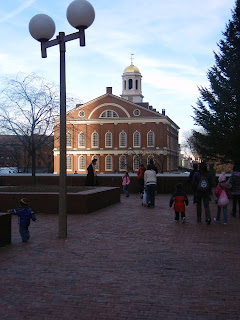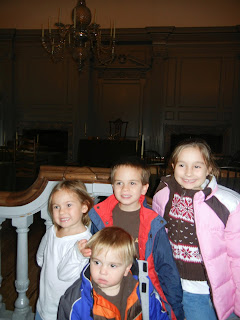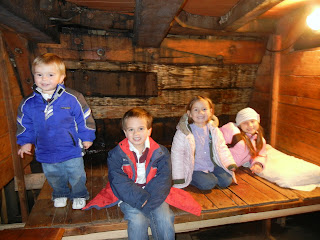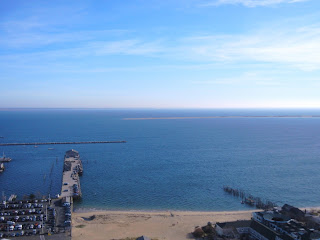Although Old Ironsides wasn't technically in our scope of study, we couldn't leave Boston without stopping in for a tour of the magnificent ship. The kids loved it, as well as the pasteries we ate just after the tour from the famous Boston bakery--Mike's Pastery. (We have no photos of the yummy treats because they were gone before we could snap a shot!)
Saturday, December 10, 2011
Friday, December 9, 2011
American History Tour: The Revolutionary War
After one hundred and fifty years of living in the New World, the colonists become discontented with the foreign rule of law being issued from Great Britain. The tensions rise and eventually culminate in the spilling of American blood in the historic city of Boston in the royal colony of Massachusetts.
March 5, 1770
British soldiers fire into a crowd of angry colonists instantly killing three people and wounding others. The event becomes known in the colonies as the Boston Massacre.

November
2, 1772
Samuel Adams organizes the Committee of Correspondence, a forerunner
of the union of American colonies.
The meeting is held in Faneuil Hall.
December
16, 1773
When the English East India Company sought financial assistance,
England allowed the company to ship surplus tea to America at low cost.
This rankled the American colonists, who resented the implementation of a
single company controlling the tea trade, as well as the right of the British
government to tax the colonies without their consent. Meeting at the Old
South Meeting House, Bostonians led by Josiah Quincy and Samuel Adams discussed
the new British tax on tea and subsequently boarded three ships in the nearby
harbor, tossing the 342 chests of tea overboard. The Boston Tea Party caused Parliament to close the port of
Boston and pushed the American colonies one step closer to war.
April
18, 1775
Two lanterns were hung from the steeple of the Old North Church by
sexton Robert Newman as Paul Revere and William Dawes rode through the night,
warning patriots that the British were coming to Concord to destroy arms.
April 19, 1775
The Battles of Lexington and Concord
Eight
Minutemen are killed at Lexington, the first battle of the Revolutionary War. Then an all out battle commences five miles away on the North Bridge in Concord. Ralph Waldo Emerson, in his "Concord Hymn", described the first shot fired by the Patriots at the North Bridge as the "shot heard round the world." Astonished that the American colonists are fighting, the British begin a bloody retreat back to Boston taking 273 casualties before making it back to the safety of the city. The Revolutionary War has officially begun.
June 17, 1775
Battle of Bunker Hill
British forces advance on American soldiers trying to occupy the hills of Boston. Twice the British charge up Breed Hill and are driven back by the Patriots' heavy fire. They suffer numerous casualties. On the third attempt to take the hill, Americans are forced to retreat from lack of ammunition. Although the British are the victors of the battle, they suffered the heaviest losses and are forced to respect the American militia.

July 4, 1776
On July 2, 1776, the Second Continental Congress, meeting in Indepedence Hall in Philadelphia Pennsylvania, votes to adopt a document declaring the colonies' independence from Great Britain. Two days later, on July 4, 1776, the document, now known as the Declaration of Independence goes public and changes the face of the nation forever.

August 1776
The Battle of Long Island
After enduring months of seige in Boston, the British army flee the city and attack the New York Bay Area. On August 27, 1776, Washington finds himself surrounded by the British soldiers and realizes he cannot win the battle. Miraculous winds and fog allow Washington's army to safely escape Long Island and retreat completely from New York City. The British will maintin New York City until the end of the war.
December 25, 1776
Washington Crossing the Delaware
By December of 1776, Washington's army is in bad shape. They have been beaten, battered, and chased out of New York and across New Jersey. To make matters worse, army enlistment is slated to end on December 31st, and most soldiers are talking of returning home. In an attempt to raise spirits through a British defeat, Washington plans a surprise attack on the Hessian soldiers camped in Trenton, New Jersey. On December 25, 1776, he and his men cross the icy Delaware River and attack in the early morning hours of the next day. The Hessian soldiers are caught completely off guard and Washington wins the battle, successfully invigorating his troups and convincing them to continue with the cause of the revolution for the long months ahead.
Washington's Headquarters 1777
Winter 1777
Valley Forge
By the Winter of 1777, the Continental Army has been through many battles and much hardship. At the close of the year, the British occupy not only New York City, but have also taken over their prize city--Philedelphia. Washington's army is forced to camp in the forelorn Pennsylvania wilderness at Valley Forge. Terrible conditions ensue and many soldiers desert the revolutionary cause. Those who remain are tried and true to Washington and to the cause of American independence.
Battle of Yorktown
Three years later, with the help of the French, the Americans are finally able to secure a defintive defeat at the Battle of Yorktown. On October 19, 1781, Cornwallis surrenders. On
September 3, 1783 the Treaty of Paris is signed and the thirteen colonies recieve full diplomatic recognition as the United States of America.
Thursday, December 8, 2011
American History Tour: The Pilgrims and the Indians
After studying Colonial American History for several months, our family had the unique opportunity of taking an extended vacation to the historic city of Boston. We gave a preview of one of the most cherished experiences of this vacation--our dinner on Plymouth Plantation--on our family blog, but the rest of our adventures are documented here on our homeschool blog.The full three week visit was much like an extended field trip where we were able to see first hand so many of the places we had learned about in our readings, including sites as far south as Philadelphia and sites as farth north as Concord. It was absolutely amazing, and an expereince none of us will ever forget. Although we could not visit all of the sights in chronological order, I am going to place them on our blog in chronological order, starting with the sights of the first New England settlers, the Pilgrims of Plymouth Plantation. There is much of the colonial history we didn't get a chance to cover, but those topics highlighted in this chronology are those subjects we did get a chance to read about and discuss.
September 6, 1620
102 pilgrims, including James, Susannah, and Mary Chilton, our ancestors, board the Mayflower Ship bound for the New World. They hope to finally gain religious freedom in their new home. While on board they suffer seasickness and countless other ailments, but refuse to become discouraged. They pray, sing, read their Bibles, and trust that God will deliver them safetly to the New World.
November 9, 1620
The Mayflower Ship arrives at Cape Cod in New England. Though the Pilgrims set out for the Hudson River Shores, they are tired of the long days at the mercy of the angry ocean and declare New England to be their new home instead. Two days later, after signing the Mayflower Compact, they send scouts out to survey the cape. Soon they realize no space for a settlement is available and decide to seek a more inland home.
December 11, 1620
A landing party comes ashore on Plymouth Harbor Beach. They wade through icey waves, fighting the wind and sea, and finally secure their shallop to Plymouth Harbor's glacial rock. They warm themselves, drink sweet spring water, and plan the village of Plymouth.
April 1620
After enduring a horrible winter in which half of the Pilgrims die, the time comes for the Mayflower Ship to return to England. Not one person asks to return with the ship. Instead they turn their attention to planting and further developing the settlement. The Settlers are led by Governor William Bradford and eventually, with the help of Squanto and other Indians, find peace and contentment in the New World. In the Fall of 1621, they celebrate their first year at Plymouth with a plentiful harvest feast. This becomes the for-runner of our modern Thanksgiving Celebration.
1630
More immigrants, the Puritans, arrive and form the Massachusetts Bay Company. Eventually the Pilgrims will merge with this company and become the royal colony of Massachusetts.
In the years that follow, eleven more colonies (Virginia was already formed) are formed and populated. Each has unique people and unique contributions to make to the growing nation-to-be.
COLONY
NAME
|
YEAR
FOUNDED
|
FOUNDED
BY
|
BECAME
ROYAL COLONY
|
London
Company
|
|||
1620-1630
|
Pilgrims
and Puritans
|
||
John
Wheelwright
|
|||
N/A
|
|||
Thomas
Hooker
|
N/A
|
||
N/A
|
|||
Virginians
|
1729
|
||
Eight
Nobles with a Royal Charter from Charles II
|
1729
|
||
Lord
Berkeley and Sir George Carteret
|
1702
|
||
Duke
of York
|
|||
N/A
|
|||
1682
|
William
Penn
|
||
1732
|
James
Edward Oglethorpe
|
1752
|
|
For example, one brilliant man named Roger Williams postulates that there should be not only greater religious freedom in the New World, but that there ought to also be a seperation made between Church and State. Although he is banished from Massechussetts for these beliefs, he eventually creates his own colony in 1636--the colony of Rhode Island. After his death, his ideas eventually become more generally accepted and are now an essential part of the American way of thinking and governing.
Other important colonial personalities (that we studied) emerging at the end of the colonial period include: Benjamin
Franklin, George Washington, William Johnson, Samuel Adams, John Hancock, Patrick
Henry, Paul Revere, Thomas Paine, Thomas Jefferson, John Adams, and James
Madison.
Subscribe to:
Posts (Atom)





















































